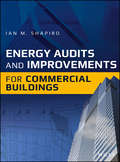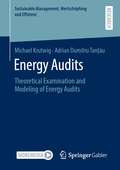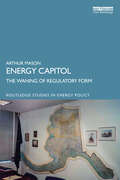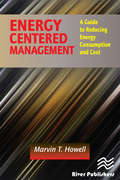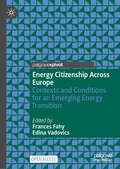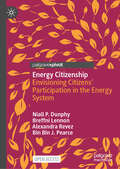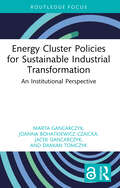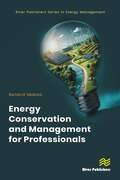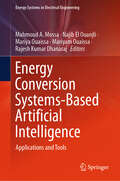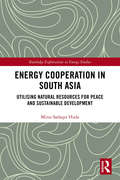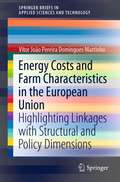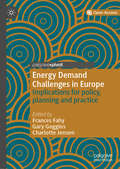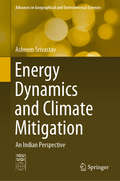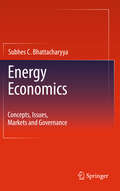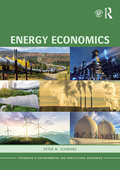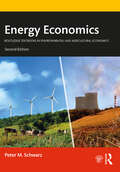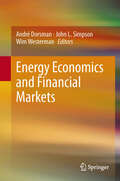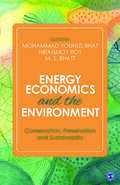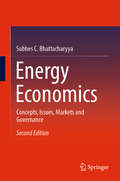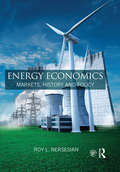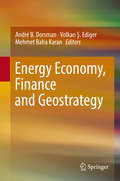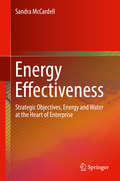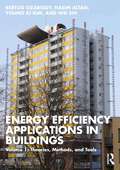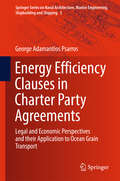- Table View
- List View
Energy Audits and Improvements for Commercial Buildings
by Ian M. ShapiroThe Intuitive Guide to Energy Efficiency and Building Improvements Energy Audits and Improvements for Commercial Buildings provides a comprehensive guide to delivering deep and measurable energy savings and carbon emission reductions in buildings. Author Ian M. Shapiro has prepared, supervised, and reviewed over 1,000 energy audits in all types of commercial facilities, and led energy improvement projects for many more. In this book, he merges real-world experience with the latest standards and practices to help energy managers and energy auditors transform energy use in the buildings they serve, and indeed to transform their buildings. Set and reach energy reduction goals, carbon reduction goals, and sustainability goals Dramatically improve efficiency of heating, cooling, lighting, ventilation, water and other building systems Include the building envelope as a major factor in energy use and improvements Use the latest tools for more thorough analysis and reporting, while avoiding common mistakes Get up to date on current improvements and best practices, including management of energy improvements, from single buildings to large building portfolios, as well as government and utility programs Photographs and drawings throughout illustrate essential procedures and improvement opportunities. For any professional interested in efficient commercial buildings large and small, Energy Audits and Improvements for Commercial Buildings provides an accessible, complete, improvement-focused reference.
Energy Audits: Theoretical Examination and Modeling of Energy Audits (Sustainable Management, Wertschöpfung und Effizienz)
by Michael Krutwig Adrian Dumitru TanțăuExisting literature on energy audits consists almost exclusively of practical guides. This book looks at energy auditing from a scientific perspective. It discusses the nature of energy audits and provides a universally applicable data model as a basis for automatic processing of a large number of energy audits. Qualitative aspects of auditing are discussed in detail. The modeling enables an improved evaluation of subsidy programs for energy audits, but also a systematic and teamwork-oriented creation of energy audits.
Energy Branding
by Friðrik LarsenDemonstrating the potential of building strong brands in the energy sector, this book explores the challenges of shifting the perception of energy from a commodity business into a consumer brand. Energy suppliers are increasingly being met with skepticism, indicating the need for a greater focus on marketing and branding in the energy industry. The author examines both perspectives of energy as a commodity business and a consumer brand, as well as the perception of energy consumers across Europe. Topics discussed include green energy, the liberalisation of the electricity industry, and the relationship between consumers and executives in the energy market. One of the first of its kind, this book offers a unique and innovative study of the development of branding in the energy industry, and sheds light on future marketing strategies.
Energy Capitol: The Waning of Regulatory Form (Routledge Studies in Energy Policy)
by Arthur MasonEnergy Capitol explores the waning of regulatory politics surrounding large-scale energy systems in the United States at the turn of the millennium.Throughout the twentieth century, large-scale energy systems in North America and Europe were highly regulated by a national political community whose decision-making authority relied on positions of bureaucratic and capitalist-led industry organization. After restructuring in energy markets such as natural gas and electricity during the 1980s, the culture of power surrounding political decision-making began to decline. Against this backdrop, Arthur Mason examines the struggle by oil companies and federal-state agencies to deliver natural gas from Alaska and Canada’s Mackenzie Valley to markets in midcontinental United States, highlighting regulatory collusion to advance their plans. Mason employs perspectives from anthropology, political science, sociology, and science and technology studies to analyze ethnographic data gathered at the Alaska State Legislature and in the Office of the Alaska Governor in Washington, D.C. The focus is primarily on plans for building an estimated $20 billion 3,500 mile pipeline to transport natural gas from the North American Arctic to midcontinental pipeline infrastructure in the United States. By illuminating key aspects of federal-state political decision-making processes on energy transportation infrastructure, Mason highlights the activities of economists, lawyers, and other regulatory intellectuals whose accumulated work impedes Arctic proposals through a reliance on judgments that no longer reflect the conditions in which large-scale projects are increasingly determined.Written by a leading expert in the field, this book will be of great interest to students and scholars of energy policy, environmental politics, governance, and regulation and risk. It will also be relevant to industry professionals working in environmental NGOs and government departments in energy and climate forecasting.
Energy Centered Management: A Guide to Reducing Energy Consumption and Cost
by Marvin T. HowellThis book provides organizations with a guide to planning, developing, and implementing an energy reduction and management program. It is specially designed to achieve energy reduction deployment including top management for all employees and onsite contractors. Energy reduction deployment (ERD) can be implemented by itself and render significant savings; however, for even greater savings, this book shows how to implement energy centered management systems (ECMS) which can be in congruence with ISO 50001. This book assists in the hunt for energy waste and is designed to thoroughly cover ECMS plus addresses what additions are necessary to have ECMS conform to ISO 50001 Energy Management System (EnMS). It provides a checklist and information on how to perform an internal audit or self-inspection and discusses how to create an energy awareness organization culture.
Energy Citizenship Across Europe: Contexts and Conditions for an Emerging Energy Transition
by Frances Fahy Edina VadovicsThis open access book is intended to provoke and progress new thinking in the field of energy research for policy makers, practitioners and scholars. By drawing on a broad range of social and innovation theory insights, this book showcases the diversity of energy citizenship and opens up the concept by including multiple ‘latent’, less visible, forms of energy citizenship that also form part of the energy transition. Focusing on how energy citizenship is considered in eight countries across Europe, each of the contributions highlight the empirical variety, the geographical differences, the contextual challenges, and the socio-political histories out of which energy citizenship develops. In exploring if there are certain convergences and similarities across contexts, the collection makes a significant contribution to debates and discussions surrounding the European Energy Union.
Energy Citizenship: Envisioning Citizens’ Participation in the Energy System
by Niall P. Dunphy Breffní Lennon Alexandra Revez Bin Bin PearceThis open access book develops a deeper understanding of an increasingly applied term across policy cycles and academic discourses, ‘energy citizenship’. It provides the reader with five distinct chapters, with each in turn examining a specific aspect of the concept and how it has manifested in public discourses.
Energy Cluster Policies for Sustainable Industrial Transformation: An Institutional Perspective (Routledge Open Business and Economics)
by Marta Gancarczyk Joanna Bohatkiewicz-Czaicka Jacek Gancarczyk Damian TomczykEnvironmental changes and related public policies require an energy-focused sustainable industrial transformation (SIT) that reconciles economic, environmental, and social objectives. Local energy clusters are conducive to these transformative processes since they represent institutional structures that link key actors and factors in territorial communities to form niches for the green transition. However, SIT policies at the local level are in a nascent stage, and empirical evidence on these processes remains scarce. Furthermore, it is necessary to advance a conceptual background for SIT and identify the development conditions for territorial energy communities. In response to these theory- and policy-related challenges, this monograph aims to conceptualize the role of energy cluster policies in SIT using an institutional approach, as well as to identify the progress of the energy cluster policies and the development stages, drivers, and obstacles of local energy clusters. The author’s empirical basis will be Polish energy clusters analyzed against international policies and experience in territorial energy communities.This book provides unique value by developing an institutional analytical framework for energy cluster policies, identifying the conditions for the development of energy clusters, and proposing actionable policy recommendations in this area.The Open Access version of this book, available at http://www.taylorfrancis.com, has been made available under a Creative Commons Attribution-Non Commercial-No Derivatives (CC BY-NC-ND) 4.0 license.
Energy Conservation and Management for Professionals (River Publishers Series in Energy Management)
by Benard MakaaThis book is a comprehensive look at the strategies, technologies, and policies driving the transition to sustainable energy management. The content is designed to convey the technical aspects of energy systems and the socioeconomic and environmental imperatives that require a shift toward more sustainable practices. It covers a wide range of topics relevant to current and future energy challenges, including the complexities of designing energy-efficient buildings and national energy policies.The book is a self-study guide for energy and non-energy professionals who either lack formal training in the subjects of energy management and conservation or simply need a means to refresh their knowledge in these subjects. Energy professionals, policymakers and government officials, academics and students, and environmentally conscious individuals will find it a useful resource. We hope this book gives you the knowledge and confidence you need to act, inspires you to come up with new solutions, and encourages you to lead by example. Let us look at how we can make a significant difference through conscious energy management and conservation.
Energy Conversion Systems-Based Artificial Intelligence: Applications and Tools (Energy Systems in Electrical Engineering)
by Mariya Ouaissa Mariyam Ouaissa Rajesh Kumar Dhanaraj Mahmoud A. Mossa Najib El OuanjliThis book aims to propose advanced solutions based on artificial intelligence techniques for ECS in order to increase energy efficiency, ensure the safety of the ECS, and to improve the quality of the energy supplied to the grid. The efficiency and quality of the electrical energy produced depends mainly on the structure and efficiency of the control technology developed for the Energy Conversion System (ECS). To improve the performance of ECSs, it is interesting to design control systems that emulate some functions performed by the human brain. Among these interesting functions are self-adaptation, learning, flexibility of operation and planning in the presence of large uncertainties and with minimal information. Based on these aspects, artificial intelligence (AI) techniques can be developed and applied to solve the different control problems of ECSs. For academics, professionals, practitioners, and graduate students interested in the most recent research on the application of AI in ECS, it is the ideal reference source.
Energy Cooperation in South Asia: Utilizing Natural Resources for Peace and Sustainable Development (Routledge Explorations in Energy Studies)
by Mirza Sadaqat HudaThis book analyses the key political challenges to regional energy cooperation in South Asia. It argues that investment in the planning of regional energy projects can increase their viability and also drive integration and peacebuilding. Regional cooperation has been substantiated by academics and multilateral development banks as one of the most viable solutions to South Asia’s crippling energy crisis. However, three decades of national and regional efforts have failed to develop a single multilateral energy project or foster high levels of bilateral cooperation. Using data collected through extensive interviews with policymakers in India, Bangladesh, Pakistan and Nepal, this book identifies the specific roadblocks to energy cooperation – including domestic politics and the failure of leadership on multiple levels - and evaluates how these political challenges determine regional interactions on energy securitisation, environmental cooperation and human rights. Huda then undertakes case studies on four transnational energy projects to highlight specific policy recommendations to overcome these challenges, suggesting planning mechanisms through which the significant issue of energy cooperation in South Asia can be addressed. This book will be of great interest to students and scholars of energy security and geopolitics, natural resource governance and South Asian politics.
Energy Costs and Farm Characteristics in the European Union: Highlighting Linkages with Structural and Policy Dimensions (SpringerBriefs in Applied Sciences and Technology)
by Vítor João MartinhoThis book explores the relationships between the energy costs and other farm variables in the European Union (including the UK) over a recent period of six years. It examines labour, farm land area, outputs/inputs, investments, assets, taxes, and subsidies in the context of policy measures and the farm structure. The book provides a deep insight into how energy cost and other factors in the farming sector relate to each other and as a result how farm planning can be made more efficient, more environmentally sustainable and more competitive. It will be of interest to policy-makers, governments, researchers and advanced students of economics, policy and the environment.
Energy Demand Challenges in Europe: Implications for policy, planning and practice
by Frances Fahy Gary Goggins Charlotte JensenThis open access book examines the role of citizens in sustainable energy transitions across Europe. It explores energy problem framing, policy approaches and practical responses to the challenge of securing clean, affordable and sustainable energy for all citizens, focusing on households as the main unit of analysis. The book revolves around ten contributions that each summarise national trends, socio-material characteristics, and policy responses to contemporary energy issues affecting householders in different countries, and provides good practice examples for designing and implementing sustainable energy initiatives. Prominent concerns include reducing carbon emissions, energy poverty, sustainable consumption, governance, practices, innovations and sustainable lifestyles. The opening and closing contributions consider European level energy policy, dominant and alternative problem framings and similarities and differences between European countries in relation to reducing household energy use. Overall, the book is a valuable resource for researchers, policy-makers, practitioners and others interested in sustainable energy perspectives.
Energy Dynamics and Climate Mitigation: An Indian Perspective (Advances in Geographical and Environmental Sciences)
by Asheem SrivastavThis book analyzes the current approaches to energy management in India that is based on a carbon-intensive pathway, which if continued, may have serious implications for climate change mitigation with severe consequences for human health and survival. India, being a signatory to the United Nations Framework Convention on Climate Change (UNFCCC), the Kyoto Protocol, and the Paris Agreement, is committed to reducing greenhouse gas emissions; however, the country’s dilemmas are whether to prioritize environment over economy or vice versa and also whether economic growth can be sustained by relying on carbon-intensive development. Those are explored in this book. The Indian economy is poised for a big leap in the near future, and the topmost priority of the government is to ensure energy security, accessibility, and affordability for nearly 1.5 billion people. Currently, 70% of India’s electricity generation comes from coal- and oil-based thermal power plants, and only 12–15% of energy is generated from renewable sources. Experts are of the view that the demand for coal and gas power generation will continue to rise and is expected to reach the equivalent of nearly 2 billion t of oil by 2030. The annual consumption of natural gas is expected to increase fourfold to 200 billion m3 a year in the near future, and its share in the primary energy basket of coal, oil, and gas will rise from 6.5% to 15% by 2030. This will not only cause a significant drain on foreign reserves but will also pose an enormous challenge to policymakers and scientists. This book serves as a useful guide in shaping India’s future energy policy.
Energy Economics
by Subhes C. BhattacharyyaSince its modest beginning in the 1970s, the academic and research focus on energy has grown substantially and energy has established itself as an independent, interdisciplinary subject area. It attracts attention from people in a range of different fields including engineers, scientists, geologists, environmentalists, bankers, investors, policy makers and politicians. Energy Economics introduces the basic concepts of energy economics and explains how simple economic tools can be used to analyse contemporary energy issues. Energy Economics is organised into six parts that give the reader a thorough grounding in various key aspects of the subject: basic demand-related concepts and ideas used in energy economics; supply-side economics;energy markets, with specific emphasis on oil, gas and coal;the application of simple economic principles in analysing contemporary energy issues;environmental aspects of energy use; andregulatory and governance issues. Energy Economics is an easily accessible reference book for students of energy economics at the postgraduate level, as well as for a wider interdisciplinary audience. It provides readers with the skills required to understand and analyse complex energy issues from an economic perspective.
Energy Economics (Routledge Textbooks in Environmental and Agricultural Economics)
by Peter M. SchwarzWith interest in topics such as climate change, energy security, and alternative energy sources being at an all-time high, the effects of today's decisions now rest on the shoulders of future generations. There are no easy answers to our energy issues, so costs and benefits must be considered when evaluating all energy alternatives; alongside that, prices must be right and need to reflect the full social costs to society of a given source of energy. Energy Economics outlines the fundamental issues and possible solutions to the challenges of energy production and use, and presents a framework for energy decisions based upon sound economic analysis. It considers market forces and policy goals, including economic prosperity, environmental protection, and other considerations that affect societal well-being. This book focuses on both energy choices and the impact of these choices on market performance, environmental conditions, and sustainability. The initial section covers the fundamental economic concepts for analyzing energy markets. Following this, a detailed analysis of established energy sources, specifically fossil fuels and nuclear energy, leads into consideration of energy alternatives such as renewable energy and next-generation alternatives. Electricity production and regulatory trends are covered in depth. The final section considers policy: environmental considerations, sustainability, and energy security. The concluding chapter is a comprehensive vision for our energy future. Drawing on current energy headlines, perspectives familiar from the popular press, and views outside economics, this text sharpens students' ability to understand, evaluate, and critique policy using appropriate economic analysis. The text builds a foundation that culminates in a view of a comprehensive energy policy that improves upon the vacillations of past decades.
Energy Economics (Routledge Textbooks in Environmental and Agricultural Economics)
by Peter M. SchwarzEnergy Economics outlines the fundamental issues and possible solutions to the challenges of energy production and use, presenting a framework for decisions based upon sound economic analysis. This approach considers market forces and policy goals, including economic prosperity, environmental protection, and societal well-being. The second edition has been thoroughly updated, addressing dramatic shifts in the use of fuel and electricity, accelerated plans for the use of renewable energy, and pathways towards a lower-carbon future. A new chapter on electric vehicles examines its impact on transportation, the electricity market, and carbon emissions. Global examples throughout the book reflect the universal application of energy economics. With this economic foundation, coupled with perspectives from real-world applications, and perspectives from related disciplines, this text sharpens the student’s ability to understand, evaluate, and critique energy policy. A companion website provides reinforcement for students through multiple choice self-test quizzes and homework exercises, as well as additional materials for instructors. This textbook should be essential reading for students of energy economics, environmental and natural resource economics, energy-related disciplines, and general readers seeking to expand their knowledge of energy economics and policy.
Energy Economics and Financial Markets
by André Dorsman Wim Westerman John L. SimpsonEnergy issues feature frequently in the economic and financial press. Specific examples of topical energy issues come from around the globe and often concern economics and finance. The importance of energy production, consumption and trade raises fundamental economic issues that impact the global economy and financial markets. This volume presents research on energy economics and financial markets related to the themes of supply and demand, environmental impact and renewables, energy derivatives trading, and finance and energy. The contributions by experts in their fields take a global perspective, as well as presenting cases from various countries and continents.
Energy Economics and the Environment: Conservation, Preservation and Sustainability
by Mohammad Younus Bhat, Hiranmoy Roy and M. S. BhattEnergy is a basic prerequisite for the growth and development of national wealth. Based on primary research, Energy Economics and the Environment integrates a network of diverse disciplines to provide a theoretical and practical understanding of the constantly neglected challenges associated with conservation, preservation and sustainability of environment and energy. It highlights the issues and prospects in safeguarding environmental biodiversity and renewable energy efficiency, ecosystem chains and human living standards. This book studies the vulnerability associated with global climate alterations that limits direct social and economic benefits from ecosystem goods and services, and presents significant methods through illustrative case studies to tackle energy and environmental questions. In its final analysis, the book proposes possible unconventional mitigation strategies to restore sustainable biodiversity of ecosystems.
Energy Economics: Concepts, Issues, Markets and Governance
by Subhes C. BhattacharyyaThis book provides an updated and expanded overview of basic concepts of energy economics and explains how simple economic tools can be used to analyse contemporary energy issues in the light of recent developments, such as the Paris Agreement, the UN Sustainable Development Goals and new technological developments in the production and use of energy. The new edition is divided into four parts covering concepts, issues, markets, and governance. Although the content has been thoroughly revised and rationalised to reflect the current state of knowledge, it retains the main features of the first edition, namely accessibility, research-informed presentation, and extensive use of charts, tables and worked examples.This easily accessible reference book allows readers to gain the skills required to understand and analyse complex energy issues from an economic perspective. It is a valuable resource for students and researchers in the field of energy economics, as well as interested readers with an interdisciplinary background.
Energy Economics: Markets, History and Policy
by Roy L. NersesianThree quarters of our current electricity usage and transport methods are derived from fossil fuels and yet within two centuries these resources will dry up. Energy Economics covers the role of each fossil and renewable energy source in today’s world, providing the information and tools that will enable students to understand the finite nature of fossil fuels and the alternative solutions that are available. This textbook provides detailed examinations of key energy sources – both fossil fuels and renewables including oil, coal, solar, and wind power – and summarises how the current economics of energy evolved. Subsequent chapters explore issues around policy, technology and the possible future for each type of energy. In addition to this, readers are introduced to controversial topics including fracking and global warming in dedicated chapters on climate change and sustainability. Each chapter concludes with a series of tasks, providing example problems and projects in order to further explore the proposed issues. An accompanying companion website contains extensive additional material on the history of the major types of fuel as well as technical material relating to oil exploration, the development of solar power and historical environmental legislation. This textbook is an essential text for those who study energy economics, resource economics or energy policy.
Energy Economy, Finance and Geostrategy
by Mehmet Baha Karan André B. Dorsman Volkan Ş. EdigerThis volume investigates the impact of energy issues on geostrategy. The crucial importance of energy and the fact that fossil fuels are not equally distributed among countries means that decisions are not only based on financial arguments, but also on the political impact. It can be said that "Energy is Politics". In three parts - 1) Energy Economy; 2) Finance; and 3) Geostrategy - academics and practitioners address both economic and political questions and present cases from several countries.This is the sixth volume in a series on energy organized by the Centre for Energy and Value Issues (CEVI). The previous volumes in the series were: Financial Aspects in Energy (2011), Energy Economics and Financial Markets (2012), Perspectives on Energy Risk (2014), Energy Technology and Valuation Issues (2015) and Energy and Finance (2016).
Energy Effectiveness: Strategic Objectives, Energy and Water at the Heart of Enterprise
by Sandra McCardellThis book describes practical ways to understand energy and water use in organizations and then manage or control that use, thereby reducing risk and cost. The author presents a strategic framework to focus on the types of questions that should be addressed internally, Including evaluation of potential projects, planning and implementing energy projects, and evaluating results. The premise is that no modern organization can exist without energy, despite the fact that energy is also one of the mandatory inputs that receives little to no attention in most organizations. This work highlights methodologies and projects that illuminate ways in which energy management is central to an organization’s success, considering in each case the four main determinants of energy use: People, Buildings, Equipment /Processes, and the Environment. The book constitutes a complete energy savings resource for business owners, middle managers, and building and energy managers, providing options, free tools, and flexible project templates.
Energy Efficiency Applications in Buildings: Volume 1: Theories, Methods, and Tools
by Wei Shi Bertug Ozarisoy Hasim Altan Young Ki KimEnergy Efficiency Applications in Buildings presents an investigation into the energy use and measures to improve the energy efficiency of existing building stock in the UK. The aim of this research is to assess the domestic energy use of statistically representative residential buildings and their occupants’ thermal comfort by considering the significant impact of overheating risks on energy consumption and occupants’ well-being.Divided into two volumes, these books present energy consumption and thermal comfort in the construction sector as a complex socio-technical problem that involves the analysis of an intrinsic interrelationship amongst dwellings, occupants, and the environment. Using case studies, the authors demonstrate the significance of improving energy efficiency and its impact on occupants during long-term heatwaves in the summer. Additionally, the volumes demonstrate how dynamic thermal energy simulation can be used as a learning laboratory for future trends in housing energy consumption reduction.Volume 1: Theories, Methods, and Tools presents the background to the research and the assessment methods and tools adopted by the research team.Volume 2: Performance Evaluation and Retrofitting Strategies describes the case studies and building performance and post-occupancy evaluations, before making strategic policy and retrofitting recommendations.The research and roadmap presented in these volumes can be used as a guidance tool for building energy modelling and performance simulation, enabling architects, building engineers, and other practitioners to close the gap between the current understanding and the actual performance of existing building stocks.
Energy Efficiency Clauses in Charter Party Agreements
by George Adamantios PsarrosThis book provides practical solutions for addressing energy efficiency as a clause term within a charter party contract. For this, upon a reflection of the regulatory craft, it analyzes key concepts of case law, and discusses them together with commercial and economic principles. In this way, the book aims at offering a comprehensive, interdisciplinary view of the chartering process, together with a new approach for safeguarding energy efficiency investments. A special emphasis is given to the maritime industry. Here, the newly developed framework, based on game theory, has been successfully applied to demonstrate the importance of including a clause term in contract negotiation to achieve protection against both an uncertain market and an even more challenging shipping environment. The book not only fills a gap in the literature, covering a topic that has been largely neglected to date, yet it offers researchers and practitioners extensive information to change the chartering process radically.
